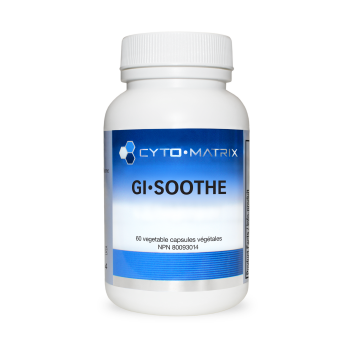GI·Soothe
- Provides a blend of deglycyrrhizinated licorice root (DGL), marshmallow root and slippery elm in highly potent extracted forms
- Indicated for reducing inflammation and irritation to the digestive tract lining, including gastritis, reflux esophagitis and irritable bowel syndrome, and preventing damage to the digestive tract as a result of anti-inflammatory medications
- 60 vegetable capsules per bottle
Irritation to the digestive tract lining can occur under many circumstances, leading to inflammation and symptoms of abdominal pain, heartburn, gas, bloating, irritable bowel syndrome and more. Traditionally, specific herbs have been used to soothe and coat the gastrointestinal lining under such circumstances, providing a mucoprotective action. These herbs are known as demulcents.
Demulcents are effective in treating diarrhea, constipation and inflammatory conditions of the gastrointestinal tract. They act by preventing microbe binding to cell membranes, binding excessive water, improving microcirculation and acting as a direct physical barrier in the digestive tract. Deglycyrrhizinated licorice (DGL), Althea officinalis (marshmallow root) and Ulmus rubra (slippery elm) are some of the most well-established demulcents with clinical efficacy.
DGL is a form of licorice root that has removed glycyrrhizin, a constituent that is responsible for increasing cortisol and fluid retention. This allows for a soothing effect on the gastrointestinal lining with minimal safety concerns. DGL has been studied for its ability to effectively treat the symptoms associated with damaged gastric and duodenal linings. Moreover, chewing DGL has also shown to have a positive effect on the gastrointestinal mucosa and some evidence suggests that DGL can help to prevent damage to the digestive tract lining caused by non-steroidal anti-inflammatory drugs (NSAIDs). Marshmallow root and slippery elm have anecdotally been used for decades as safe and effective demulcents to treat reflux esophagitis, gastritis, diarrhea, respiratory concerns and even inflammatory skin lesions.
GI·Soothe provides DGL, marshmallow root and slippery elm in high-potency extracts for effective demulcent and mucoprotective effects on the gastrointestinal tract. Available in 60 vegetable capsule bottles.
Unit of Measure above:
Each capsule
| Ingredient | Amount |
|---|---|
| Marshmallow (root, Althea officianalis) 20:1 extract equivalent to 5000mg of dry root | 250mg |
| Slippery Elm (bark, Ulmus rubra) 4:1 extract equivalent to 1000mg of dry bark | 250mg |
| Deglycyrrhizinated licorice (root, Glycyrrhizae group) 10:1 extract equivalent to 2250mg of dry root | 225mg |
Non-Medicinal Ingredients:
Hypromellose, magnesium stearate.
Traditionally used in Herbal Medicine to relieve mild inflammation of the gastro-intestinal mucosa (e.g. gastritis) Traditionally used in Herbal Medicine to relieve the irritation of the oral and pharyngeal mucosa and associated dry cough. Used in Herbal Medicine to help relieve abdominal pain and burning sensation in the stomach.
Directions for Use:
Adults (19 years and older) - Take 1 capsule, 2 times per day. Take a few hours before or after other medications or natural health products.
Cautions:
Consult a healthcare professional prior to use if • you are pregnant • you are breastfeeding. Consult a healthcare professional if symptoms persist or worsen. Keep out of reach of children.
Other Information: Do not use if safety seal is broken.
Irritation to the digestive tract lining can occur under many circumstances, leading to inflammation and symptoms of abdominal pain, heartburn, gas, bloating, irritable bowel syndrome and more. Traditionally, specific herbs have been used to soothe and coat the gastrointestinal lining under such circumstances, providing a mucoprotective action. These herbs are known as demulcents.
Demulcents are effective in treating diarrhea, constipation and inflammatory conditions of the gastrointestinal tract. They act by preventing microbe binding to cell membranes, binding excessive water, improving microcirculation and acting as a direct physical barrier in the digestive tract. Deglycyrrhizinated licorice (DGL), Althea officinalis (marshmallow root) and Ulmus rubra (slippery elm) are some of the most well-established demulcents with clinical efficacy.
DGL is a form of licorice root that has removed glycyrrhizin, a constituent that is responsible for increasing cortisol and fluid retention. This allows for a soothing effect on the gastrointestinal lining with minimal safety concerns. DGL has been studied for its ability to effectively treat the symptoms associated with damaged gastric and duodenal linings. Moreover, chewing DGL has also shown to have a positive effect on the gastrointestinal mucosa and some evidence suggests that DGL can help to prevent damage to the digestive tract lining caused by non-steroidal anti-inflammatory drugs (NSAIDs). Marshmallow root and slippery elm have anecdotally been used for decades as safe and effective demulcents to treat reflux esophagitis, gastritis, diarrhea, respiratory concerns and even inflammatory skin lesions.
GI·Soothe provides DGL, marshmallow root and slippery elm in high-potency extracts for effective demulcent and mucoprotective effects on the gastrointestinal tract. Available in 60 vegetable capsule bottles.
Unit of Measure above:
Each capsule
| Ingredient | Amount |
|---|---|
| Marshmallow (root, Althea officianalis) 20:1 extract equivalent to 5000mg of dry root | 250mg |
| Slippery Elm (bark, Ulmus rubra) 4:1 extract equivalent to 1000mg of dry bark | 250mg |
| Deglycyrrhizinated licorice (root, Glycyrrhizae group) 10:1 extract equivalent to 2250mg of dry root | 225mg |
Non-Medicinal Ingredients:
Hypromellose, magnesium stearate.
Traditionally used in Herbal Medicine to relieve mild inflammation of the gastro-intestinal mucosa (e.g. gastritis) Traditionally used in Herbal Medicine to relieve the irritation of the oral and pharyngeal mucosa and associated dry cough. Used in Herbal Medicine to help relieve abdominal pain and burning sensation in the stomach.
Directions for Use:
Adults (19 years and older) - Take 1 capsule, 2 times per day. Take a few hours before or after other medications or natural health products.
Cautions:
Consult a healthcare professional prior to use if • you are pregnant • you are breastfeeding. Consult a healthcare professional if symptoms persist or worsen. Keep out of reach of children.
Other Information: Do not use if safety seal is broken.

